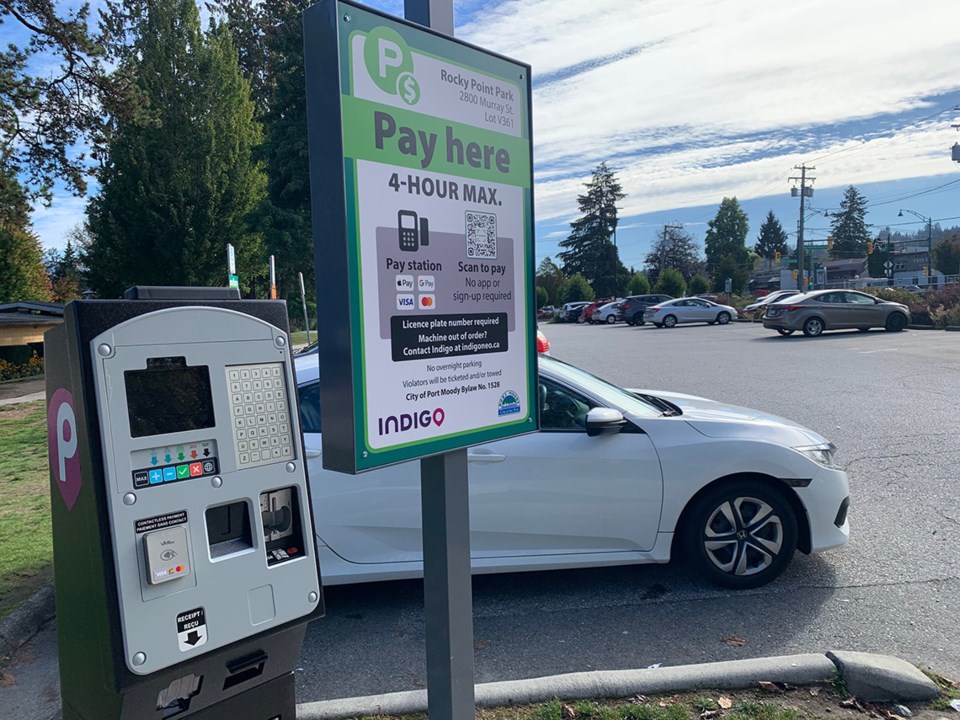Today (Sept. 16) is the first day you’ll have to dig into your pockets to park in some parts of Port Moody.
But don’t bother pulling out coins.
You’ll have to use a credit or debit card or connect your phone to an app to pay to park in about 400 spots at Rocky Point Park, along parts of Murray Street, Esplanade Avenue and Ungless Way as well in some sections of Suter Brook Village.
Pay stations installed at the five locations and managed by Indigo Canada went operational today. Here’s what you need to know:
The history
Pay parking has been talked about in Port Moody for more than 20 years. A plan that could have introduced it to the city’s downtown after a 2004 study was derailed by the provincial government’s decision to extend SkyTrain service to the city. Ten years later, a trial program that would have charged visitors $1 an hour when parking their vehicle at Rocky Point Park while allowing residents to park for free was shelved by a public backlash.
In 2019, Port Moody’s citizen advisory group revived the idea of pay parking as a way to generate revenue.
Three years later, council pondered the idea as a way to soften a proposed property tax increase. But at least one councillor said it would be a “slippery slope” that would alienate residents.
But it was a motion by Coun. Kyla Knowles in May, 2023, that finally broke through. And while it was initially deferred to allow staff time to gather more information about projected costs and revenues as well as identify potential sites, most of her colleagues agreed pay parking would help encourage turnover at parking spots at busy spots in Port Moody as well as encourage visitors to use alternate forms of transportation.
Following a staff report that largely affirmed those assertions, council’s strategic priorities committee approved a plan to introduce pay parking by the summer of 2024.
“For a long time, we’ve treated parking and car infrastructure as free, but it comes with a cost,” said Coun. Samantha Agtarap.
“We have to put our money where our mouth is around our commitment to climate change,” added Mayor Meghan Lahti.
Following final approval by council last July, the pay stations were expected to be in place by August, but “some small delays” pushed the implementation date into September.
The locations
- 222 marked stalls at Rocky Point Park
- 25 commercial unmarked spots on Morrisey Road, Suter Brook Way and a small section of Capilano Road in Suter Brook Village
- 62 spots on Esplanade Avenue, from Rocky Point Park to Murray Street
- 62 unmarked spots on Murray Street, from Columbia to Williams streets
- 32 spots on Ungless Way, from Noons Creek Drive to Guildford Way
The cost
The new hourly charges range from $1.50/hr in the off-season from September to May at Rocky Point Park, Esplanade Avenue and Murray Street to $2.50 an hour from June to August at the same locations. Rates for the spaces at Suter Brook Village and on Ungless Way will be $2.25 year round.
The charges apply from 7 a.m. to 7 p.m. from September to May at Rocky Point Park, Esplanade Avenue and Murray Street and from 7 a.m. to 11 p.m. from June to August.
At Suter Brook Village and on Ungless Way, the rates are applicable from 7 a.m. to 6 p.m.
The maximum parking duration is four hours at all locations except Suter Brook Village, where it's two hours.
Drivers of electric vehicles parked at an EV charging station will have the parking fee rolled integrated into their charging cost.
Veterans with a valid veteran's licesne plate, city staff on official city business, as well as recipients of the Freedom of the City award are exempt from the parking charges.
The revenues
A staff report presented to council last April said the new parking fees are expected to generate about $550,000 in gross revenue annually. Operational and enforcement costs will eat a large chunk of that, resulting in a net gain to the city of $85,000 to $200,000.
Port Moody’s deputy chief financial officer and manager of financial planning, Tyson Ganske, said the program will have to be in place for a full year before staff can get a true picture of its effectiveness.
“We just want to make sure we’re taking a cautious approach,” he said.



